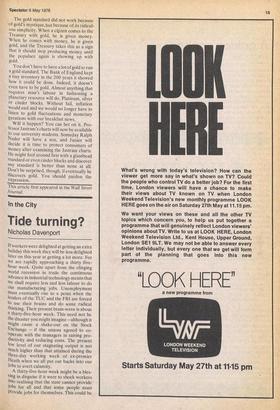In the City
Tide turning?
Nicholas Davenport
If workers were delighted at getting an extra holiday this week they will be less delighted later on this year at getting a lot more. For we are rapidly approaching a thirty fivehour week. Quite apart from the clinging world recession in trade the continuous advance in industrial technology means that we shall require less and less labour to do our manufacturing jobs. Unemployment must eventually rise to a point when the leaders of the TUC and the FBI are forced to use their brains and do some radical thinking. Their present brain-wave is about a thirty-five-hour week. This need not be the disaster you might imagine —although it might cause a shake-out on the Stock Exchange — if the unions agreed to cooPerate with the managers in raising productivity and reducing costs. The present low level of our stagnating output is not much higher than that attained during the three-day working week of ex-premier Heath when we all put our backs into our Jobs to avert calamity.
A thirty-five-hour week might be a bles sing in disguise if it were to shock workers into realising that the state cannot provide ' lobs for all and that some people must Provide jobs for themselves. This could be the beginning of the decline of the allembracing, all-loving and all-taxing Welfare State which has been taking away our self-reliance and enterprise. Professor Milton Friedman seems to think so, for, in a recent lecture in Scotland, he said: 'The tide might be turning for Britain because for two years now government spending as a fraction of the national income has gone down rather than continuing its steady upward trend.' He added: 'The old Fabian left is, intellectually bankrupt. The young in this country are far more likely to be attracted by the free-market doctrines. . .than by the standard socialist tack'.
I don't know where the Professor gathers his impressions of pur country but it is true that there is some movement — not a mass movement but a sporadic one — towards greater co-operation between workers and
managers. Witness the greatly improved labour relations in the Liverpool docks. Of course, there are disrupters still around — notably in Fleet Street, I would not be surprised to see Fleet Street close down — but not the free press which will move to other parts. Where union policy aims at sheer disruption the managements can do nothing but shut up shop and go elsewhere. But there are now more signs of workers and managers getting together to sort things out in areas where constant strikes have been upsetting nerves and exhausting patience.
The most bizarre get-together was that at Claridge's where the strike collapsed and the loyal workers were given £30 in cash or shares and an extra week's paid holiday in true old-fashioned brotherly style. Stung by this entente cordiale the unions in another hotel group —Grand Metropolitan —took up a managerial invitation to form staff committees in each hotel and elect two representatives to attend board meetings.
The professional investor now demands good relations between management and
workers before he even looks at the arithmetic of price-earnings ratio and yield. There are plenty of shares on the Stock Exchange which satisfy this test besides Grand Metroplitan. I notice that brokers are placing emphasis in their 'buying' lists on the shares of companies employed in what are called 'leisure industries'. They may well be right. We are going to have far greater leisure with a thirty-five-hour week than was ever dreamed about a generation ago. But a lot of the leisure-catering trades will never come on to the capital market. They will remain in private hands. Being a resourceful and ingenious nation we have already adapted ourselves to penal taxation by doing jobs on the side. Workers in industries which do not employ them full-time are doing private jobs for householders who pay them cash — no tax deducted. Those workers who have been declared redundant and have amassed up to £10,000 or more in redundancy payments should be setting up their own services to cater for the desperate householder who cannot get repair jobs done. These may be the small beginnings of the recovery of Britain, for, as Mr Lever has said, the small business employs about a fifth of the labour force and is going to multiply because it has had its incentives improved by tax reliefs in the budget. What the Chancellor of the Duchy is saying is in effect, that the recovery of Britain depends upon the extension of a vigorous private sector. That is precisely what we shall see if a general election is held this summer or autumn and Mrs Thatcher is put into No. 10. I am sure the chairman of Vickers will be voting for her, having had his profits holed by the nationalisation of shipbuilding and aircraft.
So Professor Friedman may be right —the tide might be turning for Britain. I actrnit that there are precious few economic signs of it at the moment. The cheaper £ has made exporting more profitable. The unemployment figures are dropping a little and the unfilled vacancies are edging up. Advertising expenditure as a percentage of the GNP is rising sharply. All this may be due merely to the taxation reliefs which allow a rise in consumer spending — and may make for a rise in inflation next year. One cannot feel sure about the recovery of Britain until,
in addition to the growth of the small business, there is a spurt at the top. This can only come when the taxation of the top managers is cut and their incentives and morale restored (which Mrs Thatcher will
surely bring about) and when, I should add, the leaders of the big unions are prepared to co-operate with them in making new investment pay. It may be significant that the FT index of equity shares is picking up. Perhaps the Stock Exchange is already beginning to discount the possibility of a turn in the tide.







































 Previous page
Previous page